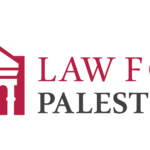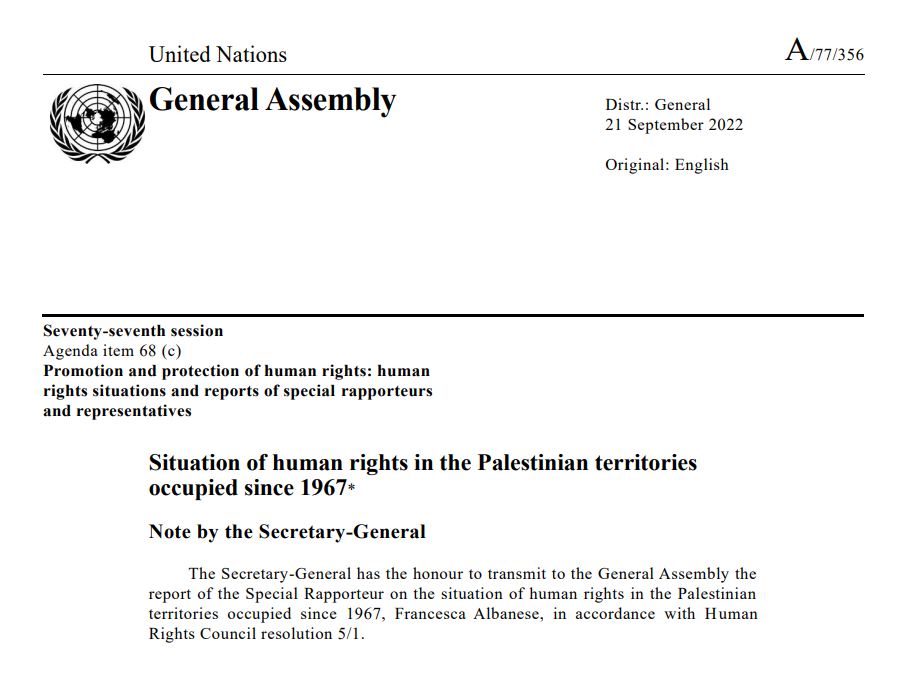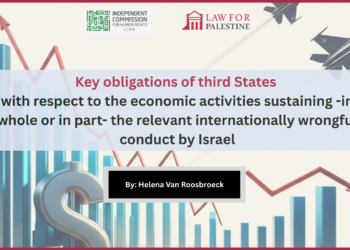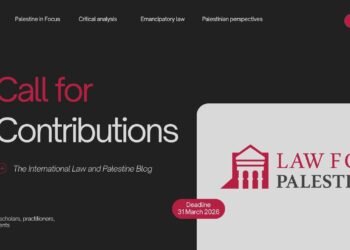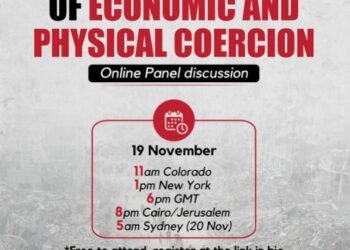Summary of the UN Special Rapporteur’s Report on the Palestinian Right to Self-Determination and colonialism dismantling
Note: A full commentary on the SR’s report is to be published by Law for Palestine soon!
Background
On September 21, 2022, the newly elected UN Special Rapporteur (SR) on the situation of human rights in the Palestinian territories occupied since 1967, Madam Francesca Albanese, submitted her first report to the Human Rights Council, pursuant to Commission on Human Rights resolution 1993/2A and Human Rights Council resolution 5/1. The report was publicly published on October 18, 2022. While drafting her report, she sought communications from the Permanent Representative of Israel, who was unwilling to engage with her, the Permanent Representative of the State of Palestine, as well as other Permanent Representatives in Geneva and regional groups.
The report, marking the first time for an SR, focused on the Palestinian right of self-determination, and its realisation in the context of the occupied Palestinian territory, trying to clarify the legal tenets, meaning and implications of this right, and how far the current reality is from its realisation.
Investigating Self-Determination: why now?
The report starts with explaining the historical evolution of the deprivation of Palestinians from their inalienable rights making clear reference to the fact that it was in 1948 that the plight started and that “[m]ost of the residents of Gaza, together with many currently facing forcible transfer across the West Bank, including East Jerusalem, are refugees – originally from Galilee, Haifa, Jaffa, Ramleh and Lydda and the Naqab.” The war in 1967 led to a further deterioration of human rights for those refugees, particularly in the West Bank and Gaza.
As for the question of self-determination, and ‘why now?’, the report makes a case for why the newly advanced apartheid normative framework, while being quite necessary to highlight the Palestinian plight and the fact that it deals with Palestinians as a people– has several limitations; especially if considered alone and not as a part of “a holistic examination of the experience of the Palestinian people as a whole.”
First, the ‘territorial’ nature of the apartheid discourse (as presented in the newly published reports) excludes Palestinian refugees. Secondly, the focus on the apartheid discourse misses “the inherent illegality of Israel’s occupation” of Palestinian territories and the subsequent violations. Thirdly, the apartheid framework cannot, when taken alone, address the root-causes of the Palestinian plight; which should be taken in full historical and settler-colonial context.
Therefore, the report suggests that this apartheid framework, as currently applied, “bypass the critical issue of the recognition of the Palestinian people’s fundamental right to determine their political, social and economic status and develop as a people, free from foreign occupation, rule and exploitation”. (para. 11).
In the same context, the Special Rapporteur notes the illegality of the Israeli occupation (confirming the position of her predecessor, Prof. Michael Lynk, and many other scholars). The report confirmed that “[t]he Israeli occupation is illegal because it has proven not to be temporary, is deliberately administered against the best interests of the occupied population, has resulted in the annexation of occupied territory, breaching most obligations imposed on the occupying power by international law”.
Having laid these foundations, the Special Rapporteur found that “[d]ismantling the Israeli apartheid in the occupied Palestinian territory in particular, while necessary, will not automatically address the question of Israeli domination over the Palestinians, restore permanent sovereignty over the lands Israel occupies and the natural resources therein, nor, on its own, fulfil Palestinian political aspirations.”. She added that in the past thirty years, mainly in the context of diplomatic “normalization” with Israel, the Palestinian people’s right to self-determination became more of an “ideological slogan rather than.. a legal reality from which clear responsibilities emanate.” Indeed, the right to self-determination “constitutes the collective right par excellence, and “the ‘platform right’ necessary for the realisation of many other rights.”
Establishing the Legal Framework of Self-Determination
The report goes in detail to elaborate and establish the Palestinian collective right to self-determination in international law as a people, and that without it “other rights will almost certainly not be realised”.
The International Covenant on Civil and Political Rights (ICCPR) and the International Covenant on Economic, Social and Cultural Rights (ICESCR) offered a universal codification for the right to self-determination. They included two intertwined components: a political component and an economic component. The political one ensures the capacity of a people to choose its own government and govern itself without interference; which entails an internal dimension (the entitlement of the people) and an external one (being free from external control and alien domination). The economic component is about the collective right of a people to enjoy their natural wealth and resources as an expression of permanent sovereignty over them.
The political component’s external dimension also implies the right to resist alien domination, subjugation and exploitation that may impede the fulfilment of self-determination.
The Special Rapporteur notes that the UN, since 1967, continued to reaffirm the Palestinian people’s right to self-determination and denounced Israel for violating it, and urged all states to extend their support to the Palestinian people in their struggle to regain their right to self-determination and independence (para. 29-30). In the view of the Special Rapporteur “it was clear that the law of self-determination legitimated Palestinians’ right to resist, by virtue of the violent and acquisitive nature of Israeli occupation from which Palestinians were struggling to liberate themselves”.
A Reality Check: 55 years with no Self-Determination
Ever since the beginning of the occupation of the West Bank and Gaza, Israel started a process of de-Palestinianising the occupied the occupied territories through several strategies developed by Israeli strategists such as the Allon Plan.
Israel, as explains the report, followed the strategies of (1) territorial fragmentation to circumvent Palestinian unity, (2) preventing economic prosperity and means to flourishment through exploiting natural resources, (3) preventing identity through erasing Palestinian cultural and civil rights, and (4) preventing political existence (and resistance) and statehood to circumvent any chance of Palestinians being able to practice their Right to Self-Determination.
Thus, and as the Special Rapporteur put it, “[t]he way that Israel has administered the occupied Palestinian territory resembles that of a colony, ‘deeply committed to exploiting its land and resources for Israel’s own benefit, and profoundly indifferent, at very best, to the rights and best interests of the protected people’”.
The Need for a Paradigm Shift!
The report adds that the Israeli efforts and strategies have led to the situation being addressed through the following approaches: a humanitarian, political and economic ones. The humanitarian approach had international law being “used to address specific Israeli violations and to ‘improve’ certain aspects of life under occupation” rather than treating the root causes. The political approach on the other hand had the current situation being called a ‘conflict’ between two ‘opposing parties’ rather than a colonial case. This view preached for a ‘negotiated peace agreement’, making the termination of the illegal occupation conditioned on negotiations. Finally, the economic approach was pushing for developing the Palestinian economy in isolation from civil, social and political rights. It aims at resolving the conflict by integrating businesses and creating opportunities towards sustainable development, with no regards to the fulfilment of fundamental human rights.
The report clearly refused these approaches for their apparent conflation between root causes and symptoms, and hence, normalising the occupation itself.
Therefore, the report called for a paradigm shift in the approaches “by opting for a solution premised on the respect for history and international law”, starting with “the cardinal norm of peoples’ right to self-determination and the recognition of the absolute illegality of the settler-colonialism and apartheid that the prolonged Israeli occupation has imposed on the Palestinians in the occupied Palestinian territory”.
In her concluding observations, Madam Francesca Albanese concluded that the nature of the Israeli occupation is that of an “intentionally acquisitive, segregationist and repressive regime designed to prevent the realisation of the Palestinian people’s right to self-determination”. She adds that the Israeli denial of the Palestinian right to self-determination aligns with colonial practices of the past, and that the dismantling of this “settler-colonial regime” and system of occupation and apartheid is a requirement to the realisation of the Palestinian inalienable right to Self-Determination; which gives rise to obligations erga omnes that cannot be derogated from under any circumstances. This requires that third states do not recognise as lawful, nor aid or abet, the illegal situation created by the Israeli colonial polices that constitute a breach to the right of Palestinian people to self-determination.
In the words of the Special Rapporteur, “No solution can be just and fair, nor effective, unless it centres on decolonization, allowing the Palestinian people to freely determine their political will and pursue their social, economic and cultural development, alongside their Israeli neighbours. The international community must embrace a more accurate diagnosis of the Israeli settler-colonial occupation in the occupied Palestinian territory and abide by its own obligations under international law to fully realize the Palestinian people’s right to self-determination“. (para 74).
Finally, the report concludes that the “Middle East ‘peace process’ and subsequent bilateral peacemaking attempts have proven ineffective” due to their overlooking of human rights and the settler-colonial underpinnings of the Israeli occupation, in their approaches.
In her recommendations, the Special Rapporteur recommended that, inter alia, all states “[c]ondemn the intentional violations by Israel of the Palestinian right to self-determination including through settler-colonial practices”, and demand an immediate end to Israel’s illegal occupation and return of all land and resources the Palestinian people have been dispossessed from. She demanded that the UN General Assembly develops a plan to end Israel’s settler-colonial occupation and apartheid regime by pressuring Israel to comply with international law, and that States stand ready to resort to countermeasures afforded by the UN Charter in case of non-compliance by Israel; including adopting the necessary policies to regulate business’ conduct in the occupied Palestinian territory so as to hold accountable those complicit in the settlements. Moreover, the report called for accountability through both the International Criminal Court (ICC) and universal jurisdiction mechanisms.
—
* Full report can be found here (click)
** Here in this post on our social media platforms (links below), we briefly address why this report of the UN Special Rapporteur is important and what are its legal implications.

